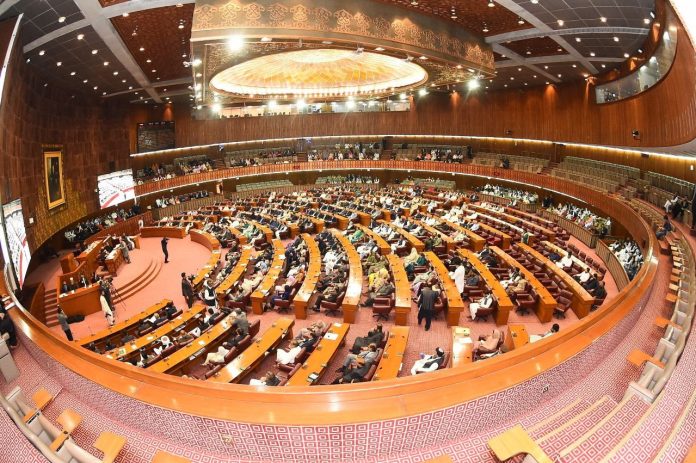——– Bill caps CJP’s tenure at three years
——– Aims enforcing judicial reforms that have been a bone of contention between govt and opposition
——– Sets Jan 2028 deadline for end of Riba practice
——– Paves way for interest-free banking
——– PTI maintains to keep boycott of the new legislation
Staff Report
ISLAMABAD: The coalition government on Sunday finally powered the disputed 26th Constitutional Amendment Bill, 2024, through the Senate, capping the Chief Justice of Pakistan’s (CJP) tenure at three years, despite opposition from the Pakistan Tehreek-e-Insaf (PTI).
The bill was tabled hours after the federal cabinet approved the draft amendments after hanging in balance for weeks. The house voted 65-4 to approve the 26th Constitutional Amendment Bill with the required two-thirds majority. The political leaders continued to hold consultations on the constitution-al tweaks till late Saturday night, with uncertainty regarding the tabling of the draft due to severe op-position from the PTI.
The coalition government was initially set to present the legislation yesterday but decided to defer it at the request of the Jamiat Ulema-e-Islam-Fazl (JUI-F) chief Maulana Fazlur Rehman who said that his party would be able to cast its votes in favour of the 26th constitutional amendment after receiving a response from the PTI.
The former ruling party has time again expressed concerns over the prospective judiciary-oriented legislation provisioning a fixed three-year term of the Chief Justice of Pakistan (CJP), establishment of constitutional benches, restructuring of the Supreme Judicial Council, and the formation of a Special Parliamentary Committee which will suggest names from amongst the three most senior judges of the apex court for the CJP’s appointment. Addressing the Senate session, Federal Minster for Law Azam Nazeer Tarar said that the government’s allied parties and Jamiat Ulema-e-Islam-Fazl (JUI-F) reached a consensus on the draft of the constitutional amendment bill.
As part of the government’s efforts, a special parliamentary committee comprising representatives of all the political parties discussed the proposed constitutional package.
The law minister, speaking on the floor of the Upper House, requested Senate Chairman Yusuf Raza Gilani to allow him to table the draft of the 26th Amendment Bill.
He pleaded with the chairman that the proposed amendments should be tabled in the House as a supplementary agenda. He informed the House that the procedure to appoint judges had been changed in the 18th Amendment.
“Chief Justice of Pakistan (CJP) Qazi Faez Isa has consistently expressed his lack of interest in extend-ing his tenure as the top judge,” the law minister said in response to the criticism from the opposition.
Once again, dispelling the widespread notion, the minister categorically stated that CJP Isa would retire as scheduled.
Additionally, the minister mentioned that one of the draft amendments pertained to the constitution-al benches of the apex court.
Stressing the necessity of judicial reforms, Tarar, without specifically naming anyone, referred to a former chief justice who frequently issued suo moto notices. Furthermore, Tarar remarked, “Our courts sent elected prime ministers home.”
Detailing the bill, the law minister said that a constitutional bench would be established within the Su-preme Court.
He added that the judges would be appointed by the judicial commission, and the commission should have the authority to assess the judges’ performance.
“Constitutional benches will be formed by the commission, and the term of the top court would be limited to three years, with the top judge being selected from the three senior-most judges of the apex court,” Tarar said giving an overview of the bill.
To enhance the legislature’s role in appointing judges, Tarar mentioned that the 12-member parlia-mentary committee, with a two-thirds majority, would appoint the CJP.
In the updated draft, it was also noted that constitutional benches could be established in the provinc-es. The minister emphasised that the purpose of the bill was to provide prompt and affordable justice to the common man and urged the Upper House to vote in favour of the bill.
Speaking on the upper house floor, PTI Senator Barrister Ali Zafar termed the Constitution a “social contract”, that unites the nation. “If there is no consensus, the Constitution will die its own death,” he said.
He pointed out that the Constitution is formed with the consent of the people and the “amendments should also be made with their consent.”
Zafar cited the example of Article 58(2)(b) — which empowers the president to dissolve the govern-ment — saying that both Pakistan Muslim League-Nawaz (PML-N) and Pakistan Peoples Party (PPP) governments became targets of this amendment.
“Such amendments, which are made without consensus, can damage the country’s democracy.”
He noted that it had been decided in PTI’s parliamentary committee meeting that they would not vote on the constitutional amendment.
“We have taken signatures of all our members […] If any of our members vote, then do not count it,” the PTI Senator asked the Senate Chairman.
He further said that they were not part of “any process” and had not provided a “single clause”.
Referring to his 45-minute meeting with Imran Khan, Zafar said the PTI founder was unaware of the country’s political situation and questioned the urgency for the passage of constitutional amendment before October 25 — the day the incumbent chief justice would retire. Speaking of the draft, he pointed out that there were “serious mistakes” which should be addressed.
“A constitutional court isn’t being formed but constitutional benches are,” he said, adding that the process of appointing judges has been kept by the government. “There will be a huge confusion as to which cases will be heard by constitutional benches,” he noted.
In her speech on the floor of the upper house of the parliament, PPP Senator Sherry Rehman criticized the opposition for not proposing a single point during the 10 sittings of the parliamentary committee.
She emphasised that their actions were not an “attack” but rather paving the way for the parliament to claim its rights.
The PPP lawmaker also praised Bilawal Bhutto-Zardari for his efforts in building a broader consensus on the constitutional package among the political parties.
After the speeches, the House passed the motion to vote on the constitutional amendments by ma-jority vote. Before the voting, opposition lawmakers demanded that PML-N leader Rana Sanaullah and the Attorney General of Pakistan (AGP) be sent out of the House. However, the treasury senators as-serted that it was their — Sanaullah and AGP — constitutional right to sit in the House.
Today, the parliamentary committee of PTI announced boycotting the voting process but soon back-tracked as Chairman Barrister Gohar said that the party lawmakers would go to the [parliament] floor.
However, later, while speaking to journalists along with Fazl, PTI Chairman Gohar said that his party would not vote for the proposed constitutional amendment in the parliament.
“The party will abstain from voting and present its stance while sitting in the parliament,” Barrister Go-har said. He also lauded Maulana Fazl for his support in opposing the constitutional package.
“Imran Khan will always have the final say on party decisions, so we take every instructions from him,” the PTI chairman said.
He noted that the PTI founder had instructed them to have “more consultations since this legislation is so serious”.
“Given that we have no time for further consultations, and how the bill was processed and how our parliamentarians were harassed, the PTI cannot vote for this bill,” he announced.
Furthermore, he said the party has “no objections” if Fazl votes on the bill.
For his part, the JUI-F chief said they have “defanged the black snake overall” as he referred to the draft of constitutional amendments. He noted that the bill, which they had rejected, has been tweaked.
“PTI has no objection to the content,” Fazl said, noting that they can’t force “any political party” to vote for the amendment. He added that PTI has every right to oppose after “what the party and its founder suffered”.
In response to a question, he said they have agreed on a constitutional package “but not on its de-tails”.
Prime Minister Shehbaz Sharif, after the federal cabinet’s go-ahead, hailed the decision as a major achievement for Pakistan’s development and progress.
“The cabinet has made an excellent decision for the development, prosperity and the betterment of the country’s overall situation,” said the PM while addressing the cabinet session.
He congratulated the nation on the approval the 26th Amendment, emphasising that it was made in the larger national interest.
He also reiterated the government’s commitment to public welfare and the constitutional integrity of the country. “By the grace of Allah, after stabilising the economy, we have now crossed a milestone for constitutional stability and the rule of law in Pakistan,” he said.
Looking ahead, the premier assured that the government would continue working diligently for the country’s development, prosperity, and stability in line with the promises made to the people, he af-firmed.
The judiciary-oriented constitutional package proposed a set of constitutional amendments, including provisioning a fixed three-year term of the CJP.
A special parliamentary committee — which has the representation of all political parties — has been discussing various proposals, including the establishment of constitutional benches, restructuring of the Supreme Judicial Council, and the formation of a Special Parliamentary Committee which will sug-gest names from amongst the three most senior judges of the apex court for the CJP’s appointment.
Earlier, The 26th Constitutional Amendment Bill, 2024, recently passed by the Senate, has established a deadline of January 1, 2028, for the end of the practice of Riba (interest-based banking) in the country.
The clause was added to the draft amendments at the suggestion of Jamiat Ulema-e-Islam-Fazl (JUI-F), the Maulana Fazl-ur-Rehman-led regio-political party, which gave the government a tough time in presenting the draft of the amendment bill.
To eradicate this form of usury, the Senate approved the amendment in clause (f) of Article 38 of the Constitution, which pertains to the promotion of social and economic well-being.
The current clause states that “eliminate Riba as early as possible,” and the government replaced this with “as far as practicable, by the 1st of January, 2028.”
Earlier in 2022, the Federal Shariat Court gave the government five years to implement an Islamic and interest-free banking system in the country, as the economic system of an Islamic country like Pakistan should be free of interest.
Justice Dr Syed Muhammad Anwer read out the verdict that was reserved by a three-member bench of the Federal Shariat Court.
The verdict stated that abolition of Riba is fundamental for an Islamic system, adding that “any transac-tion involving Riba is wrong”.
“The abolition of Riba and its prevention is in accordance with Islam. The interest taken in any case, including debt, falls into Riba, which is completely forbidden in Islam,” said the Federal Shariat Court.
The Shariat court’s verdict also stated that interest given on external and internal loans by the gov-ernment also falls under Riba.
“The government should ensure that internal, external loans and transactions should be made inter-est-free. Transactions with international institutions, including the IMF and World Bank, should be made interest free as well,” said the court.
It must be noted that in line with the Federal Shariat Court’s ruling on Riba, the State Bank of Pakistan (SBP) has granted in-principle approval for establishing a digital retail Islamic bank and Shariah compli-ant digital banking through Islamic window operations.
According to SBP’s Governor’s Report 2023-24, released on October 18, 2024, the Federal Shariat Court’s judgement on Riba provides a clear direction, for which SBP is collaborating with the govern-ment and other stakeholders, and is actively working for the implementation of the judgment. “In this regard, a multi-pronged approach has been adopted under the guidance of a high-level ‘Com-mittee for Transformation of Conventional Banking into Islamic’,” the report said.
This includes a review of existing domestic laws and comparison with international best practices, as-sessment of existing regulatory framework, awareness sessions on Islamic banking and finance, and capacity building of stakeholders, as per the SBP report.
The central bank says it is dedicated to fulfil its statutory obligation for the elimination of Riba from the country’s banking system.
Accordingly, the central bank’s fourth strategic plan, “SBP Vision 2028” in November, 2023, includes “Transforming to a Shariah-Compliant Banking System (SG-4)” as one of the strategic goals.




